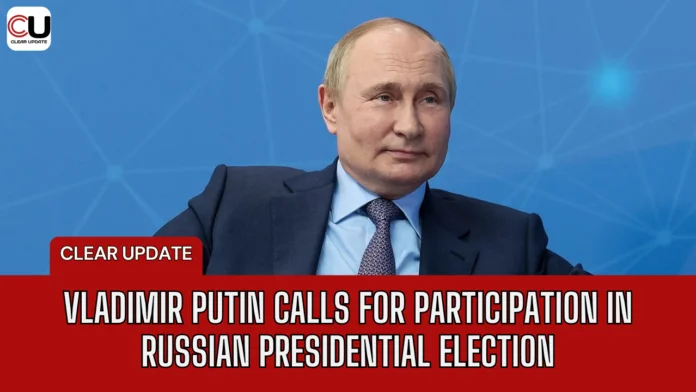Vladimir Putin
Vladimir Putin has called on Russians to participate in the presidential election, citing it as a “manifestation of patriotic feeling” and a “step into the future“. The election is taking place amid a ruthless crackdown on dissent and foreign threats, with Ukraine reportedly firing missiles at the Belgorod border region, killing two people and wounding 12.
Vladimir Putin has eliminated nearly all independent media and opposition voices in Russia, particularly after the 2022 full-scale invasion of Ukraine. Analysts suggest that the Kremlin is worried about low turnout and needs Russians to participate to ensure Putin’s reelection.
Upholding Unity and Consolidation
President Vladimir Putin‘s message resonates with a central theme of unity and consolidation, urging citizens to exercise their democratic right and contribute to the collective decision-making process.
He emphasized the collective journey forward, highlighting the significance of individual votes in shaping the nation’s path. This call for participation reflects the essence of democracy, where each voice matters in the broader tapestry of national governance.
Read Aso: TikTok’s Security Threats Go Beyond the Scope of House Legislation
Historical Context: Putin’s Election Addresses
Vladimir Putin’s address marks a continuation of a longstanding tradition, wherein he has addressed the nation ahead of previous federal elections. Throughout his tenure, he has underscored the importance of civic engagement and the electoral process as pillars of Russian democracy.
With past addresses in 2000, 2004, 2016, and 2018, Vladimir Putin has consistently sought to galvanize public participation and reinforce the democratic foundations of the Russian state.
Addressing Political Dynamics
Amidst the electoral fervor, political dynamics within Russia have garnered international attention. The anticipated outcome of Vladimir Putin’s reelection has prompted discussions about the future trajectory of Russian politics.
Reports from CNN suggest a consolidation of power reminiscent of a ‘president-for-life’ narrative, with Putin’s political longevity raising questions about the country’s future political landscape.
Read Aso: 7 Tips to Make You a Google GEMINI Pro | Clear Update
Assessing Stability and Transition
The absence of visible preparations for a post-Putin era has raised concerns regarding political stability and transition within Russia. As the nation approaches another presidential term, the lack of apparent successors underscores the enduring influence of VladimirPutin’s leadership.
This narrative prompts reflections on the mechanisms for political succession and the resilience of Russia’s political institutions amidst potential transitions of power.
Global Participation: Early Voting Abroad
Meanwhile, early voting for the presidential election is underway globally, reflecting the transnational nature of Russia’s electoral process. Russian citizens abroad have the opportunity to participate in shaping the country’s leadership through early voting mechanisms facilitated by diplomatic missions. The smooth conduct of early voting underscores the commitment to ensuring electoral integrity and accessibility for citizens worldwide.
Read Aso: Top 10 Most Powerful Men On Earth | Clear Update
Institutional Framework: Federation Council’s Role
The official scheduling of the presidential election by the Federation Council, the Upper House of the Russian Parliament, exemplifies the institutional framework underpinning Russia’s electoral process. As a key legislative body, the Federation Council plays a pivotal role in overseeing the legality and integrity of electoral procedures, reinforcing the democratic principles enshrined in the Russian Constitution.
Vladimir Putin’s Enduring Legacy
Vladimir Putin’s tenure as the longest-serving leader since Joseph Stalin symbolizes a defining chapter in Russian history. His leadership style, characterized by a centralized and authoritative approach, has shaped the country’s domestic and foreign policies. As the nation braces for another term under his stewardship, Vladimir Putin’s enduring legacy prompts reflections on continuity, change, and the evolving dynamics of Russian governance.
Read Aso: Pakistan: Imran Khan and wife Bushra Khan jailed on Charges of Illegal Marriage
Conclusion
In conclusion, President Vladimir Putin’s call for participation in the upcoming presidential election encapsulates the essence of democratic engagement and civic responsibility.
Against the backdrop of global scrutiny and domestic dynamics, the electoral process serves as a cornerstone of Russian democracy, reflecting the collective will and aspirations of the nation. As citizens exercise their right to vote, they contribute to the ongoing narrative of Russian political evolution and societal progress.




